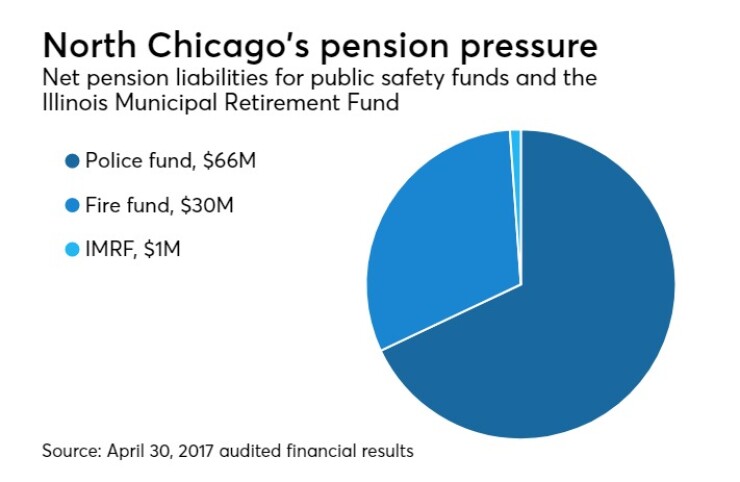CHICAGO – North Chicago, Illinois, took a three-notch downgrade tied to its failure to deal with retirement funding strains so bad that one of its public safety funds asked the state to garnish city revenues under a new enforcement tool.
S&P Global Ratings dropped the city 33 miles north of downtown Chicago to BBB from A Tuesday and assigned a stable outlook. The city has about $20 million of outstanding debt, according to its latest audited financial results.

"The downgrade reflects our view of North Chicago's structural imbalance, which stems from multiple years of the city paying substantially less than actuarially determined amounts to its police and fire pension plans," said S&P analyst Eric Harper.
The city of about 30,000 has shorted its pension funds by about $1.8 million, or 7% of general fund revenue, annually over the last three years, S&P said. The city’s view of management is weakened by the “severity” of the underfunding and a lack of what S&P considers a “credible plan to address the structural imbalance.”
North Chicago’s mayor blamed the city council for the downgrade because of its failure to act.
“City staff members presented a sustainable, creditable plan to address the pension issues and structural imbalance,” Mayor Leon Rockingham said in a statement. “Regrettably, some members of the city council did not want to adopt this plan even though they were fully aware of the consequences.”
The council last week rejected proposed layoffs, furloughs, and salary cuts for some employees but agreed to a salary freeze for some, leaving a more than $1 million deficit in a roughly $24 million budget.
The city has seen limited revenue growth in recent years and hasn’t cut spending to account for increasing pension contributions, S&P said. The city does have a strong liquidity with cash available totaling $24 million.
"The stable outlook reflects our view that North Chicago, despite its structural imbalance related to its pension payment deficiencies, will maintain very strong available reserves and liquidity over the outlook period,” Harper said.
The city recently settled the firefighters' fund claim, lessening the more immediate effects of its pension funding challenges and contributing to S&P's stable outlook.
The firefighters’ fund board earlier this year submitted a certified claim of $863,000 to state Comptroller Susana Mendoza’s office seeking the diversion of various taxes that flow to the city through the state.
A 2011 law that requires municipalities outside Chicago make contributions to its public safety pension funds at a level to reach a 90% funded ratio by 2040 provided a revenue intercept mechanism that the comptroller's office implemented this year. The new diversion program that potentially puts pension funds ahead of bondholders drew municipal market attention when public safety funds sought revenue to satisfy $19 million of claims against the distressed city of Harvey.
S&P warned in a May 14 report that the intercept could cast a
"Should the intercept law's use become commonplace, significant credit strain could result across a sector that has already struggled to effectively deal with rising pension costs," Harper wrote.
The comptroller had so far intercepted about $726,000 from North Chicago but the city firefighters’ board settled the claim for $150,000 and the city agreed to make a $150,000 payment to its police pension fund in fiscal 2019. The police pension board had not filed a pension intercept claim and North Chicago told S&P it doesn’t expect new claims to be filed in the near-term.
“While we believe there is some potential for future pension intercept claims, particularly if North Chicago continues to underfund pension contributions, we expect that the city will maintain very strong reserves and liquidity,” S&P said.
The city has a $66 million police fund net pension liability and $30 million firefighters' fund liability, according to its
The comptroller recently said the well-funded statewide fund – Illinois Municipal Retirement Fund -- that covers local government workers outside of Chicago also can use the intercept. The city is carrying just $1.1 million net payment liability to that fund and its most recent payment met an actuarial level of $421,000 in 2016.





